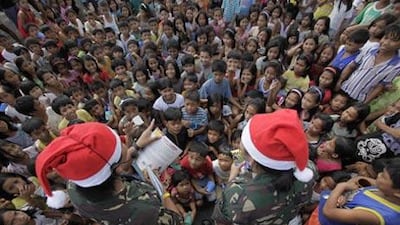MANILA // Christmas Eve is one of the biggest celebrations of the year in the predominantly Christian Philippines, but tens of thousands of refugees from the Mount Mayon volcano in the east of the country are finding it hard to be merry, despite a concerted effort to cheer them up. Mayon continues to tremble and blow columns of ash high into the sky. Fountains of lava spout from its crater and lava streams five kilometres long ooze down its slopes.
Government scientists said a hazardous eruption could occur any day now. This could include pyroclastic flows - currents of superheated gas and volcanic debris that race down the mountainside, incinerating everything in their path. More than 47,000 residents of the danger zone - anywhere within an eight-kilometre radius of Mayon - are now crowded into evacuation centres, where they must spend Christmas and probably New Year, disaster relief officials said.
The refugees are mostly from communities that farm the fertile land around the base of the volcano. They are now safe from any hazardous eruption, and they have shelter, food, water and medical attention. But they face Christmas away from home. So the authorities and charities are trying to make their Christmas as enjoyable as possible under the circumstances. Joey Salceda, the governor of the surrounding province of Albay, who is in charge of the relief effort, said the material needs of the refugees had already been met.
"What we need now are clowns, actors and stress debriefers. We don't need rice these days," Mr Salceda said. The evacuation centres are mostly school buildings, and some are decked with Christmas decorations thoughtfully left behind by the pupils and teachers before they turned over the premises. Charities have put on concerts and variety shows, held parties and organised children's games for the entertainment of the refugees. Even policemen, sporting red Santa Claus hats, have joined the entertainers.
Defence Secretary Norberto Gonzalez, who is in charge of disaster relief nationally, has given Mr Salceda one million pesos (Dh79,000) to buy Christmas gifts for the refugees. President Gloria Arroyo has visited some of the evacuation centres to help distribute relief goods. The Roman Catholic Church has been catering to the spiritual needs of the refugees, and is ready to help meet their material needs.
"We don't want people to think we are in a sorry state," said the local Bishop Joel Baylon. "If there is a need for assistance on the part of the Church, we will always be ready." Mr Salceda distributed packages of special food to the refugees so they could celebrate with a traditional Christmas-eve meal. "We will make them feel the spirit of Christmas and New Year as if they are staying in their own homes," the provincial governor said.
Each family (five people, on average) is getting a package containing two kilograms of noodles, two apples, two oranges, chocolate and cheese. Mr Salceda's efforts are praised by outsiders. "No one runs an evacuation operation like Joey Salceda," said University of the Philippines professor of political science Alex Magno. "If there was an impresario for public safety in the face of calamity, Joey has to be it."
The refugees themselves, while glad to be safe, appear less than overwhelmed by the attention lavished on them. "It's uncomfortable here, said one man. "But they are keeping us entertained." Some refugees have complained about inadequate water supplies, a shortage of sanitation facilities, and the lack of privacy. In some evacuation centres, there are up to 100 people living in one classroom. "I would be better off at home," said one woman. "At least, there, I would be together with my family."
She explained that her husband was still in the danger zone, which is supposedly a no-go area cordoned off by troops and police. The husband is there to look after the family property. A constant headache for the authorities is the tendency among some of the refugees to sneak back into the danger zone to take care of crops or livestock. Mr Salceda said some refugees have sneaked back time and time again, only to be found by the security forces and escorted out on each occasion.
To keep the refugees in the evacuation centres, the authorities have offered to supply them with firewood and have their livestock taken care of on government-run agricultural research stations. Mr Salceda said he was also suspicious about the refugees' motives for sneaking home, especially when couples tell him they go to "feed the pigs". This, he suspects, is a euphemism for enjoying their conjugal rights in privacy - something difficult to do in the crowded evacuation centres.
Mr Salceda said that to solve this problem, he was thinking of offering the refugees vouchers allowing them to celebrate Christmas in hotels that rent out rooms by the hour. @Email:foreign.desk@thenational.ae

